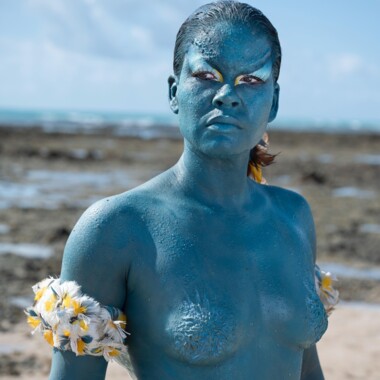
WHERE RIVERS MEET
Lilly Baniwa, Ziel Karapotó, Olinda Tupinambá
Amazonas, Alagoas, Bahia
As part of this year's Theaterformen festival, Lilly Baniwa, Ziel Karapotó and Olinda Tupinambá meet in Hanover and connect with the city, its landscapes, and the rivers Ihme and Leine. Their interdisciplinary artistic practices include performance, film, installation, and activism. Based on the understanding that we are not outside of nature, but part of it, they explore alternative forms of kinship that extend beyond the human. This shift in perspective redefines our connection to the environment and leads to a deeper understanding of entanglements. WHERE RIVERS MEET resists the Western logic that reduces rivers and nature to a resource to be exploited, consumed, and used. The program focuses on Indigenous knowledge about rivers, which are carriers of memory, knowledge, and relations.
WHERE RIVERS MEET is curated by Jacqueline Azarmi Eskandani (Jacq) and Jamille Pinheiro Dias.
The following events are art of the WHERE RIVERS MEET programme:
Sat, 21.06.
Currents
Sun, 22.06.
We Are Rivers
Mo, 23.06.
Salon K: Cultural Reforestation
Sat, 28.06. & Sun, 29.06.
Confluences
Lilly Baniwa is an Indigenous actress, performer, artist and researcher from the Amazon region. Her most recent performances include SER-UMA-NÓS (BEING-US-HUMAN) and Antes do tempo existir, which she both developed and performs. Among her newest projects are the video performance manifesto Lithipokoroda and the workshop IPerformatividades Identitárias.
Ziel Karapotó is a multidisciplinary artist, curator and filmmaker. His artistic practice and research is characterized by the exploration of Indigenous poetics, identity configurations and racism against Indigenous communities. In 2024, he was one of three Indigenous artists representing Brazil at the 60th Venice Biennale with the work Cardume II (School of Fish II). His most important audiovisual works include the short film The Word Became Flesh (2019), the documentary Speeches of the Earth (2021) and the short film Paola (2022).
Olinda Tupinambá is a multidisciplinary artist with a degree in Social Communication. She is a cultural worker, performer and filmmaker. Her work is characterized by using her body as a political body - a body that transforms to speak of other possible worlds, to make environmental-political issues visible and to discuss the relationship between humans and nature, which is a recurring theme in some of her works. She has been working in the field of audiovisual media since late 2015, producing and directing ten independent films in the fields of documentary, fiction and performance.
Jacqueline Azarmi Eskandani (Jacq) is a curator based in Berlin. From 2020–2024, they worked as an artistic collaborator for Festival Theaterformen and contributed to projects such as An Urban Laboratory on Climate Justice, A Gathering in a Better World, A Sign for the Future, and KO'EYENE. Prior to this, they worked in PR at HAU Hebbel am Ufer and with the production team of Tanz im August, among others. Jacq is particularly interested in artistic practices and issues relevant to marginalized communities, as well as in anti-discriminatory curatorial practices.
Jamille Pinheiro Dias is a lecturer and director of the Centre for Latin American & Caribbean Studies at the University of London. Her research focuses on Amazonian cultural production, environmental humanities, Indigenous arts and translation issues related to Latin America, with a focus on Brazil.
Production credits
With Lilly Baniwa, Ziel Karapotó, Olinda Tupinambá Curators Jacqueline Azarmi Eskandani (Jacq), Jamille Pinheiro Dias Photo Lila Rodrigues